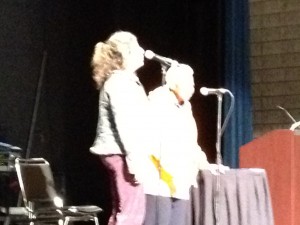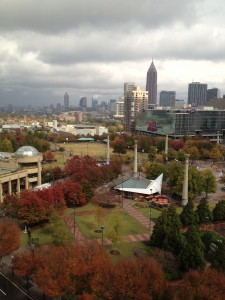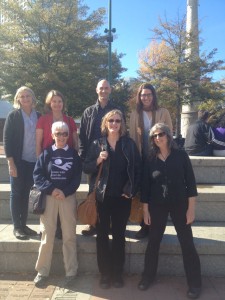By Kerry Drake
 On election night, the staff landed in Atlanta, Georgia, for the National Association of the Education of the Young Child Conference. All of us felt very fortunate to have the opportunity to go to the National Conference. This year, staff continuing-education hour requirements almost doubled, taking us to 24 hours of continuing education. Take me seriously when I say it is very difficult to find engaging and meaningful CE classes in early childhood. There are some frighteningly dull, soul-sapping sessions to be found in the world of early childhood CE. Fortunately, at the national level, there are varied topics, studied on deeper levels. We all found meaningful sessions at the Atlanta conference, and we also significantly knocked down our CE requirement hours thanks to this trip. Furthermore, it was a gift to have time to be together as a staff and share ideas and feelings (and nice meals!) in a different environment.
On election night, the staff landed in Atlanta, Georgia, for the National Association of the Education of the Young Child Conference. All of us felt very fortunate to have the opportunity to go to the National Conference. This year, staff continuing-education hour requirements almost doubled, taking us to 24 hours of continuing education. Take me seriously when I say it is very difficult to find engaging and meaningful CE classes in early childhood. There are some frighteningly dull, soul-sapping sessions to be found in the world of early childhood CE. Fortunately, at the national level, there are varied topics, studied on deeper levels. We all found meaningful sessions at the Atlanta conference, and we also significantly knocked down our CE requirement hours thanks to this trip. Furthermore, it was a gift to have time to be together as a staff and share ideas and feelings (and nice meals!) in a different environment.
Here are some snippets of meaningful moments I found from speaking with some of the staff and through my own reflections of workshops I attended.
Emily was quite engaged and pleased with a session she attended on an outdoor classroom. She reported that this workshop helped her gain clarity about an idea she thinks about a lot: bringing inside activities outside. In this workshop, a teacher described the project work undertaken with seasonal plantings, using nature as a seasonal guide. There were different hands-on planting activities discussed. One was “From Seed to Food”: i.e. they planted wheat then harvested the berries, then ground it and made it into bread. This workshop was inspirational in its scope, for the preschool developed a working relationship with a working farm. Emily suggests the book from this farm, called “Seasonal Projects” for further exploration.
 Of course, Emily found inspirational workshops in the musical realm. Emily told me how she was reminded at this conference about how songs & singing are so important and provide so many learning opportunities in language, math, pre-music, rhythm and joy, to name a few. She also has a renewed interest in learning an instrument to accompany the children during musical interludes.
Of course, Emily found inspirational workshops in the musical realm. Emily told me how she was reminded at this conference about how songs & singing are so important and provide so many learning opportunities in language, math, pre-music, rhythm and joy, to name a few. She also has a renewed interest in learning an instrument to accompany the children during musical interludes.
One session topic that Emily has already implemented in her classroom is Balls and Ramps. She notes this is an amazing way to combine encouraging thinking processes with a lot of fun. All the aspects of balls and ramps involve so many important things: block building, physical motion, andmaterial properties. She has already noticed how the building and testing of the ramps encourages observation skills, budding scientific inquiry and an interesting vocabulary: sliding, rolling, dropping, etc. The configurations and games are endless. She invites folks to come watch and view the set-up, which is simple enough to also implement at home.
For my part, a session called “Beyond I’m Sorry” stood out for me. Perhaps this quote on one of the websites best caught my attention and recognition:
“You cannot do a kindness too soon because you never know how soon it will be too late.”
— Ralph Waldo Emerson
Charles A. Smith, Ph.D., ran this session, and he has background as a preschool teacher, therapist and author. In this session a code of 5 caring convictions was mentioned:
- Be kind to others
- Be faithful to your word
- Be fair in your relationships
- Protect and defend the vulnerable and the weak
- Protect yourself (when not in conflict with first four)
These five convictions remind me of the modeling the Co-op environment provides for all these. In fact, as Charles Smith spoke about the role of the teacher, I was reminded again of what happens daily at the Co-op: spontaneous compassionate teaching moments, expressing genuine appreciation, nurturing, calming, appropriate environment, storytelling, group activities, etc. Each day, when the Co-op is moving as it should and at its best, these things are happening inherently and also modeling to the children on multiple layers. A key idea from this workshop was that caring is caught not taught. The Co-op seems a likely place to catch it! A few sites I have to share from this workshop which you may find worth looking at (but I have not fully explored) are the following:
- InSight of Caring – www.insightofcaring.com
- Responsive Discipline – www.k-state.edu/wwparent/courses/rd/
Tom reports he attended a few sessions on the importance of play. There was a continuing theme to them that was “in defense of play” and the great importance of unstructured time in children’s lives. Several data points were presented regarding the issues that occur for children when they don’t have play time in the community or school –issues such as depression, obesity, and bullying. Clear links were made to these consequences and the lack of unstructured play. He says his workshops discussed ways to revisit play, how to put it back, and encourage a change in mindset for schools that have a lack of play. Tom also was engaged with one workshop about developmental sequencing and the ways to observe where a child is in a developmental sequence and work to help encourage growth and develop in that child to achieve the next step.
 Nadia’s favorite session was lead by Maria Sargent, Ph.d. from Ashland University. The workshop involved a description of breaking down into steps the ways children learn. For Nadia, it reiterated the importance of storytelling, felt-boards, puppets, and modeling characters by giving voice to figurines, for example. In other words, it reviewed ways to build on conversational ability. Specifically, Nadia told me about the stages for print recognition this workshop discussed: stages that involved photo recognition, a black and white drawing, an outline, and finally a symbol. In particular, the outline is crucial to picking up letter recognition. She noted that for some children, missing a stage of representational interpretation can lead to later trouble reading. However, for some children, it does not impact ability.
Nadia’s favorite session was lead by Maria Sargent, Ph.d. from Ashland University. The workshop involved a description of breaking down into steps the ways children learn. For Nadia, it reiterated the importance of storytelling, felt-boards, puppets, and modeling characters by giving voice to figurines, for example. In other words, it reviewed ways to build on conversational ability. Specifically, Nadia told me about the stages for print recognition this workshop discussed: stages that involved photo recognition, a black and white drawing, an outline, and finally a symbol. In particular, the outline is crucial to picking up letter recognition. She noted that for some children, missing a stage of representational interpretation can lead to later trouble reading. However, for some children, it does not impact ability.
More reflections: Susan mentioned the sweet irony of running into other Co-op staff at sessions due to similar interests (even with so many choices!). She found the variety of sessions wonderful to chose from, and overall, the experience further deepened her realization of how awesome the Co-op is in philosophy and implementation of philosophy. (She also really enjoyed the staff dinner!).
 Though my time ran short for fully interviewing Maaike and Pat, they have both expressed how good it was to be together as a staff and to have choices for interesting workshops for our continuing education.
Though my time ran short for fully interviewing Maaike and Pat, they have both expressed how good it was to be together as a staff and to have choices for interesting workshops for our continuing education.
Thank you Co-op board and families for making this trip possible!
-Kerry
